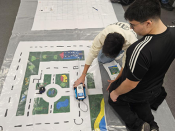Por Eduardo Skapinakis (Universität Tübingen / NOVA FCT).
Consider the following scenario: a computer is given a statistical hypothesis (e.g., "this coin is fair") and random samples (e.g., the outcome of n coin tosses). Can the computer verify the hypothesis with a bounded error probability? To answer this question, I will introduce computable statistical learning theory and give a characterization of the statistical hypothesis that can be verified with computable methods. No prior knowledge of statistics or computability will be assumed.
Transmissão via Zoom (pw: 919 4789 5133).




















